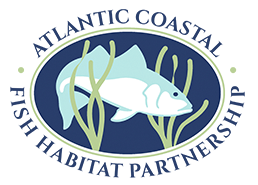January 10, 2019
ACFHP has recently endorsed a project in northeast Florida to restore coastal wetlands to their natural function. Through a partnership among state (Florida Fish and Wildlife Conservation Commission [FWC], St. Johns Regional Watershed Management District [SJRWMD], Florida State Parks), federal (US Fish and Wildlife Service [USFWS]), and the local community, this project will restore spoil piles to an elevation suitable for saltmarsh plant colonization in northeastern Florida. These spoil piles were created during dragline ditching operations conducted in the mid-1900s for mosquito control purposes, and consist of remnant wetlands, deep channels, and upland plants – including invasive species such as Brazilian pepper. These areas are often designated as impaired for certain water quality parameters including chlorophyll A, dissolved oxygen, nitrogen, and phosphorus. By converting the spoil piles to intertidal salt marsh, sediments can accrete, absorb nutrients from the system, and provide oxygen to the surrounding waters. This work will increase the production, protection, and effective passage of resident and transient fish and invertebrate species, especially post-larval recruits.
So far, approximately 625 acres of dragline ditches have been restored to yield approximately 250 acres of new tidal wetland, with hundreds more acres remaining. Restored wetlands can produce about 50 lbs. of fish per acre per year. The cost-effective techniques used in this project have been applied throughout coastal Florida with demonstrable success. In addition, intertidal salt marsh is more likely than spoil piles to keep up with sea level rise via sediment trapping and detrital deposition, providing a long-term solution to some of the climate change impacts affecting Florida.
To learn more about this project, visit: https://www.atlanticfishhabitat.org/project/restoration-of-dragline-ditched-coastal-wetlands-in-northeast-florida/.
To find out how you can receive a project endorsement from ACFHP, visit: https://www.atlanticfishhabitat.org/project-endorsement/.
Thumbnail photo provided by SJRWMD.
